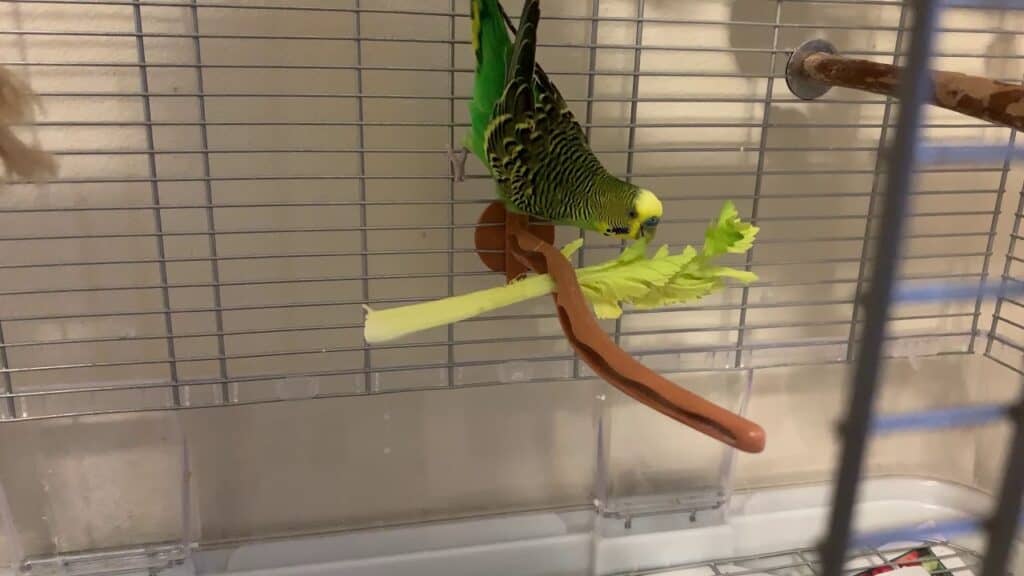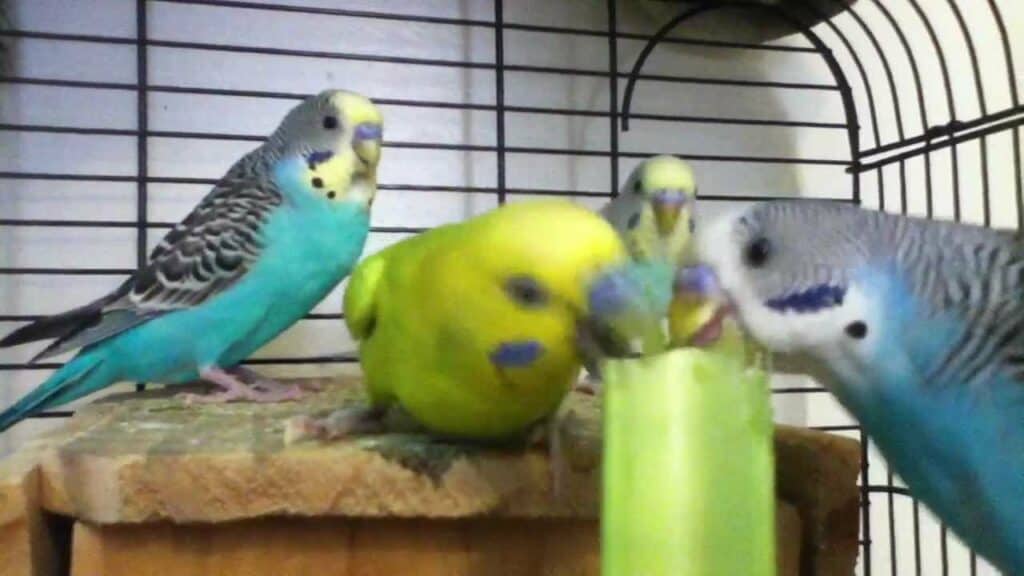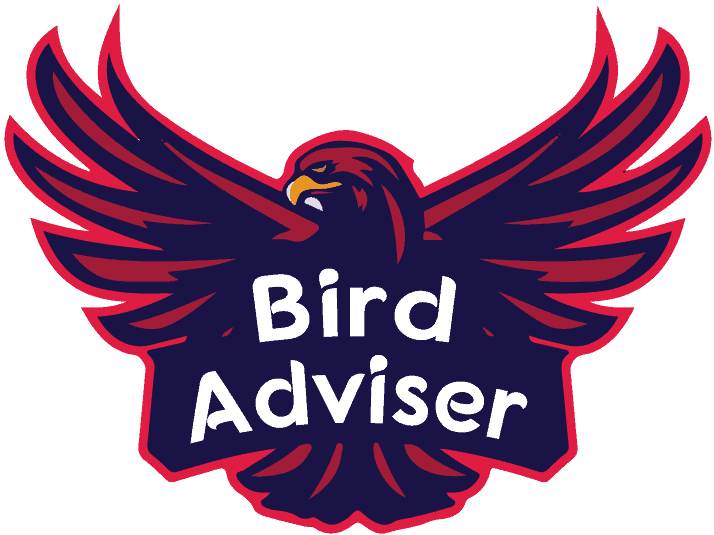Can Parakeets Eat Celery? Yes, Parakeets can indeed eat celery, but there are a few important considerations to keep in mind.
Celery can be a safe and nutritious treat for parakeets when offered in moderation.
It’s a low-calorie vegetable that contains vitamins and minerals, such as vitamin K and potassium, which can contribute to their overall health.
However, celery should not be a staple in their diet.
It’s best to offer small pieces of fresh, washed celery as an occasional addition to their regular diet.
Make sure the celery is free from pesticides and dirt, and cut it into manageable sizes for your parakeet.
While providing celery, it’s crucial to maintain a balanced diet that includes a variety of other fruits, vegetables, pellets, and seeds specifically designed for parakeets.
Monitoring your parakeet’s reactions to celery and ensuring it doesn’t replace essential dietary components will help ensure their nutritional well-being.

Is Celery Healthy For Parakeets?
This vegetable is healthy for the parakeet, but it is not healthy enough to fulfill its daily body needs.
It contains some nutritional values that can nourish the parakeet, but they can fill proper needs.
Usually, veggies are a very strong source of vitamins and minerals for parakeets, but celery doesn’t have enough quantity to provide.
All in all, it’s not dangerous at least, so don’t worry about feeding it to your parakeet.
Celery itself isn’t harmful or dangerous for parakeets, but it can contain harmful bacteria or pesticides that may not be good for the health of a parakeet.
According to the USDA Pesticide Data Program, it was found that there are 64 different pesticide residues on single celery.
This is a high quantity of impurity which means they can be highly dangerous if not washed properly or cleaned well.
To feed celery to your bird, you first have to remove pesticides by soaking it in a mixture of water and baking soda.
After that, you should give it to your parakeet when it’s dried.
Celery Nutritional Values
| Nutrients | Quantity |
| Energy | 17.6 Calories |
| Vitamin C |
3.4 mg
|
| Vitamin E |
0.3 mg
|
| Niacin | 0.4 mg |
| Riboflavin |
0.1 mg
|
| Vitamin A |
54.6 IU
|
| Thiamin | 494 mg |
| Sodium |
88.0 mg
|
| Potassium | 286 mg |
| Calcium |
44.0 mg
|
| Iron | 0.2 mg |
| Magnesium |
6.8 mg
|
| Phosphorous |
12.1 mg
|
| Zinc |
0.1 mg
|
| Carbohydrates |
12.9 g
|
| Protein |
3.0 g
|
| Dietary fibers | 1.8 g |
Source: SELFNutritionData
Vitamins and Minerals
- Celery contains small amounts of vitamins and minerals, and it’s also a source of Vitamin K.
- Parakeets also get some fiber and vitamins from celery, and it is also a source of antioxidants.
- They are not unhealthy veggies, but they can be a good alternative to provide to a parakeet in case there is no option of veggies available from you at the moment.
How Often Can Parakeets Eat Celery?
Parakeets need fresh fruits and vegetables to stay healthy, and 15-30% of their diet should be made up of them.
Celery doesn’t provide enough nutrients to a parakeet, so it shouldn’t be considered a regular diet for the parakeet.
It should be fed as an alternative diet to a parakeet.
You can feed it often twice or thrice a week or maybe more, but it’s not actually necessary.
How to Feed Celery to Parakeets?
Celery can be directly offered to a parakeet, but you just have to be careful about the leaves.
Consider removing the leaves first, and don’t let your parakeet eat them as they might get sick.
Whenever you are offering celery to a parakeet, always wash it with warm water and baking soda to clean any pesticides and bacteria on it.
How Many Celery Should I Feed My Parakeet?

Experts have recommended that celery should only be fed once a week to a parakeet as it doesn’t play any role in building up the good health of a parakeet, so it should only be considered as an alternative food option for the parakeet.
Alternative Foods for Parakeets
If your parakeet is not interested in eating celery or if you want to feed something else to your parakeet, then there can be several options to choose from.
Here is a list of some food that can be helpful in feeding a parakeet in case he doesn’t want to eat celery.
- Bananas
- Pineapples
- Mango
- Apples
- Oranges
- Cucumber
- Carrots
- Asparagus
- Zucchini
- Blueberries
- Watermelon
- Peas
- Broccoli
- Coconut
- Strawberries
- Corn
Conclusion
In conclusion, the question of whether parakeets can eat celery highlights the importance of responsible and varied avian nutrition.
While celery can be a healthy addition to a parakeet’s diet due to its low-calorie content and nutritional benefits, it should be approached with care and moderation.
Offering small, washed, and properly cut pieces of celery as an occasional treat can provide some enrichment and variety for these charming birds.
However, it’s crucial to remember that celery should not replace the core components of a balanced diet, which should include high-quality pellets, fresh fruits, vegetables, and seeds formulated for parakeets.
By offering a diverse range of foods and observing how our feathered friends respond, we can ensure their well-being and enjoy a deeper connection with these delightful avian companions.
FAQ
Is celery nutritious for parakeets?
Celery is low in calories and contains vitamins and minerals like vitamin K and potassium, which can provide some nutritional benefits to parakeets.
How should I prepare celery for my parakeet?
Wash the celery thoroughly to remove any pesticides or dirt. Cut it into small, manageable pieces that your parakeet can easily handle.
How much celery can I give to my parakeet?
Offer only small amounts of celery as an occasional treat. Celery should not replace the core components of a balanced diet.
Can celery be a regular part of a parakeet's diet?
No, celery should not be a regular or substantial part of a parakeet’s diet. It should be given infrequently and in moderation.
Are there any risks associated with feeding celery to parakeets?
Celery itself is generally safe for parakeets when given in moderation. However, overfeeding any new food can upset their digestive system.
Last Updated on August 18, 2023 by Lily Aldrin
